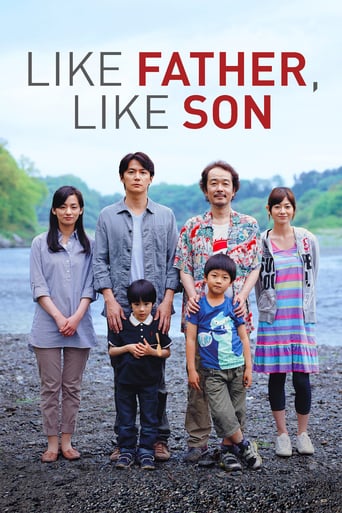WILLIAM FLANIGAN
Viewed on Streaming. Subtitles/translations = ten (10) stars. Director Hirokazu Koreeda (who is also credited as the sole screen writer and editor) treads much too lightly on a tale filled with dramatic possibilities. Perhaps the Director feared his story could easy degenerate into an overly melodramatic morass, since he frequently steers his film in the opposite direction resulting in trivia and wooden acting. The plot involves the revelation (after the criminal statue of limitations has expired) that male babies were deliberately switched immediately after birth. This apparently is not unusual at the local hospital that lacks basic controls to prevent these crimes. However, it does employ a lawyer who seems to specialize in such matters. The photo play deals with the discovery of, family reactions to, and "final" remediation of the issue. (Maintaining the status Quo (and minimizing the trauma) via quick reciprocal adoptions would seem like a straight-forward approach, but it is never seriously perused. Perhaps this is because it would abruptly end the story and turn the movie into a short subject!) Impact of vastly different family socioeconomic conditions (one with a rising-Salaryman-star father; the other with a small-shopkeeper father) becomes a major plot point often eclipsing the baby-switching factor (a more accurate movie title might be: "Like Family (Fortunes), Like Son"!). Koreeda seems to have focused his energy on directing his child actors (understandably, as they are usually a major challenge), and, in the process, neglected the performances of his adult actors. Further, those playing the parents in the Salaryman family are miscast. The "score" mostly consists of fragmented piano playing (the Salaryman's "son" is learning to play this instrument) which is overly done. But not completely to the point of boring irritation. Subtitles are excellent with opening and closing credits completely translated. All closing credits can be viewed just in English! An extreme rarity in Japanese films. Doumoarigatou Goziamashita! Worth watching, but don't expect too much. WILLIAM FLANIGAN, PhD.
rhaphazard
The pacing was masterful. The camera knew just how long to hold a shot, and was never in a rush to cut. Yet, so much seemed to be happening. Time seemed to slow, but the storytelling had a brisk rhythm.The characters had personality and depth. The movie never strayed too far from the theme of family, making each important moment all the more impactful.There were three massive payoffs, one in each third of the movie. You are awarded for you patience in spades.## SpoilersThe first payoff comes in the form of light and timing, when shadow falls over the train right when the mother is talking about the father.When they're camping by the river and Keita asks his father, "Do they love me?... More than you?" And he answers with what he believes to be brutal honesty.And when the father discovers the photos his son took of him on the camera.Bonus payout: when the nurse's adolescent son defends her.These scenes made me weep.
T K
I caught this film on a United flight in spring 2014 while flying to Japan. It was also recommended to me by a Japanese friend so I believe it has some popularity in the mainland. Without any expectations that were too high, I thoroughly enjoyed the film. The acting, from the parents to the children, was superb. And understanding how Japanese culture can be, it embellished on the role of family vs. work life. The plot was credible and the movie did not have any slow parts. The ending had me in tears though, and it made me think about what I would have done or how I would have acted if I were in the character's shoes. I would recommend this to those who enjoy drama themes (with a little comedy) and those who liked to be moved.
MrsHenry
What does it mean to be a parent? Are father/son relationships based on DNA or love? In exploring these issues Koreeda produces a sublime, indeed I would say a perfect, film - perfect in every aspect: narrative, characters, acting, filming, soundtrack. All this is achieved in a relatively low key way - no histrionics in terms of story, acting or film making, but this is not to say that the film is unemotional: quite the contrary. Some scenes are devastatingly powerful. The contrast between the two families is brilliantly drawn, and all the characters have depth. Koreeda gives us some wonderful shots - particularly the journeys between the two homes. The scene at the river, where the two families share a picnic at a pivotal moment, is truly great. Father and son sit on the stony shore as the man tries to explain why the boy must leave, while behind them in the river stands an enormous boulder, unmoving yet constantly washed and imperceptibly eroded by the flowing water. The image is obscure but powerful. In sum, it is impossible to overpraise Koreeda who wrote, directed and edited this film.










